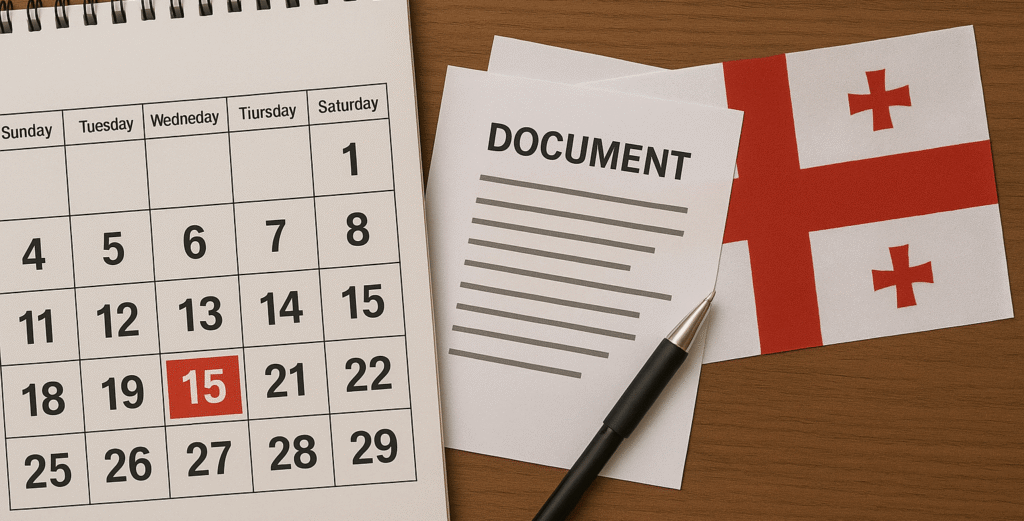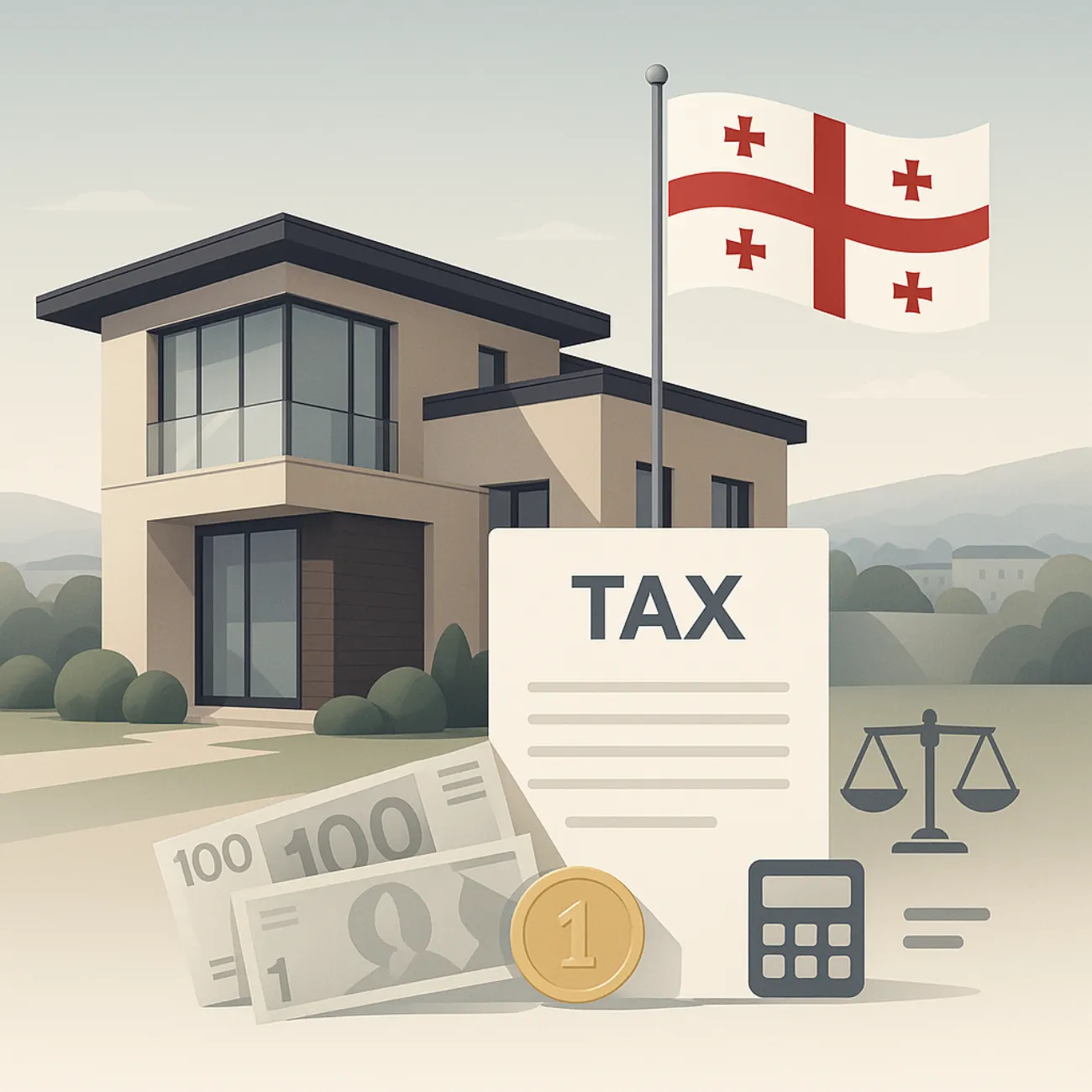Georgia in recent years has become a real find for those who dream of buying property abroad. The simplicity of transactions, loyal rules and the absence of visas for citizens of many countries make this country particularly attractive. Imagine: you can buy a cosy flat in Tbilisi or a house in the mountains without unnecessary paperwork. And this is not a fantasy, but a reality.
Attractiveness of Georgia for investors
Georgia has become a real oasis for many investors. Low property taxes and minimal bureaucracy allow you to focus on the main thing - making a profit. Here, property taxes in Georgia will not become a headache like in some other countries. Investors can calmly analyse the market without worrying about excessive tax liabilities.
Impact of taxes on profitability
However, as in any business, taxes play an important role in the profitability of an investment. Knowing the subtleties of property taxation in Georgia will not only help to avoid unpleasant surprises, but also to correctly calculate the profitability.
For example, the tax on renting a flat in Tbilisi is only 5% of gross income if you rent to an individual. This is quite a favourable offer, don't you agree?
This article will be useful for anyone considering a buying property in Georgia: investors, tenants, emigrants and just those who want to learn more about the possibilities of this country. We'll break down all the nuances - from Georgia property sales taxes to Georgia rental registration. So if you want to understand the intricacies, stay tuned.
General system of real estate taxation in Georgia
Georgia is famous for its simple and transparent property taxation system. This is one of the reasons why foreigners and locals are actively investing in property here. Let us understand why it is so attractive.
Basic principles of taxation
In Georgia, the tax system for property owners is really simple. Low rates and minimum bureaucracy make the process of owning and managing property more accessible. For example, property tax in Georgia is set by local municipalities and usually ranges from 0.05% - 1% of the value of the property. This is significantly lower than in most European countries.
Tax residence
It is important to understand when you are considered a Georgia tax resident.
If you spend more than 183 days a year in the country, you become a tax resident.
This means that you are obliged to declare your income and pay taxes in accordance with Georgian legislation. This rule is important to take into account, especially if you plan to reside in the country for a long time.

Separation of taxes: possession, rent, sale
The property tax system in Georgia is divided into several categories: ownership, rental, and sales taxes.
For example, capital gains tax in Georgia is 5% on the gain on the sale of property.
However, if you have owned the property for more than two years and have not used it to generate income, no tax is charged. This makes long-term investments even more favourable.
Filing of declarations
Filing tax returns in Georgia is maximally simplified. You can do it online through the tax portal. This means you don't have to stand in queues or fill out a bunch of paper forms. All you need is internet access and a little time to fill in the necessary data.
This system makes Georgia attractive to investors, tenants and anyone who wants to minimise their tax liabilities.
Tax on income from rental property
When it comes to renting out property in Georgia, understanding tax liabilities becomes a key aspect to successful asset management. Let's delve into the details.
When leasing to an individual
Renting out real estate to individuals in Georgia is a process that can be both simple and profitable. Let's break down all the details.
Tax rate and specifics
The tax rate for renting a flat in Tbilisi when you rent to an individual is only 5% of the gross income. This means that if your rent is $800 per month, you will only pay $40 in tax. This makes financial planning much easier and makes investing more predictable.
No deduction of expenses
One of the features of taxation in this case is that the expenses are not deductible. This means that all the costs of repairing, maintaining or improving your home do not reduce your tax base. So it pays to plan your budget in advance and factor these costs into your return.
Registration with the tax authorities
To take advantage of the low tax rate, you need to register with the tax office as a tax payer. This is a mandatory step that can be easily completed online through the portal. Registration ensures that you comply with all legal requirements and avoid penalties for non-payment of taxes in Georgia.

When leasing to a legal entity
Renting out property to legal entities in Georgia requires a more detailed approach, but it can also be very profitable. Let's look at all aspects.
Tax rate and calculation
When you rent a property to a legal entity, the tax rate is 20% of the net income. This means you can deduct all documented expenses such as repairs, depreciation and utilities from your income. For example, if your rental income is $15,000 and your expenses are $3,000, the tax will be calculated on the remaining $12,000. This allows you to more accurately account for real costs and optimise your tax liability.
Documentary evidence of expenditure
In order to take advantage of the deductibility of expenses, it is necessary to have all documents supporting these expenses. This may include invoices, receipts and contracts with contractors. Without proper documentation, the expenses will not be accounted for and you will lose the opportunity to reduce your tax base. Therefore, it is important to keep careful records of all transactions and keep all documents in order.
Peculiarities of commercial property lease
Leasing commercial property to legal entities may also include additional conditions and requirements. For example, the tenant may require certain improvements or modifications to the premises, which can also affect your costs. Take this into account when entering into a lease and planning your budget.
These aspects make letting property to legal entities more complex, but also offer opportunities for greater flexibility in managing income and expenditure.
Registration with tax authorities
Registration with the tax authorities is a mandatory step for anyone planning to rent out property in Georgia. It is not only a legal requirement, but also a way to simplify tax administration.
Registration process
Registration with tax authorities in Georgia takes place through an online portal. This is a convenient and fast way to avoid bureaucratic delays. You will need to create an account, fill in the necessary forms and provide information about your property. Make sure that all data is accurate and up-to-date to avoid problems in the future.
Advantages of registration
Registration entitles you to a favourable tax rate and simplifies the process of filing tax returns. It also helps you avoid fines and penalties for non-compliance with tax laws. This is especially important for those who are planning long-term investments and wants to ensure a steady rental income.
Tips for successful registration
For successful registration, make sure that you have all the necessary documents such as a certificate of ownership and a lease agreement. It is also advisable to consult a tax consultant or a lawyer to make sure that all aspects are taken into account. This will help avoid mistakes and misunderstandings during the registration process.
These steps will help you build a relationship with the tax authorities and ensure that your property transactions are legal.
Property tax (real estate tax)
Who pays property tax
Property tax in Georgia applies to all property owners, but it is important to understand exactly who is obliged to pay it and in what cases.
Owners who do not use the property as their primary residence
If your property is not your main place of residence, you are liable to pay property tax. This applies, for example, to properties that you rent out or use for commercial purposes. In such cases, the tax burden may vary depending on the location and type of property.
Income-producing property
If your property generates income - be it rental or commercial use - you are also liable to pay tax. This applies to both individuals and legal entities. It is important to keep in mind that the tax rate is set by local municipalities and can range from 0.05% to 1% of the value of the property. This makes it important to understand local tax requirements and regulations.
Exemptions and exemptions
There are certain exemptions and benefits for those who use real estate as their primary residence. For example, certain categories of citizens may be exempted from paying tax or have reduced rates. These may be pensioners, disabled people or large families. In order to take advantage of these benefits, it is necessary to submit a relevant application to the tax authorities and provide supporting documents.
Understanding who is liable to pay property tax will help you avoid unpleasant surprises and plan your budget properly.
tax rate
The property tax rate in Georgia can vary depending on several factors, including the location of the property and its use. Let's break it down in more detail.
Rate setting by local municipalities
In Georgia, the property tax rate is determined by local municipalities. This means that it can vary significantly from region to region. Usually, the rate ranges from 0.05% to 1% of the cadastral value of the property. For example, in Tbilisi the rate may be one and in Batumi - another. Therefore, it is important to check these details with the local authorities.
Influence of property type
The type of property also affects the tax rate. Residential properties, commercial properties and land plots may be taxed at different rates. For example, commercial properties are often taxed at a higher rate than residential properties. This is because commercial activities generate more income, and tax policy takes this factor into account.
Calculation examples
To better understand, let's look at an example: if your property value is $100,000 and your tax rate is 0.5%, your annual tax will be $500. This is an easy way to estimate your tax liability and plan your budget. However, it's always worth checking with your local government for current rates and rules to avoid mistakes.

Filing of declaration
Filing a property tax return in Georgia is an important step for every property owner. Let's look at how this process is organised and what you need to take into account.
Deadlines for filing the declaration
In Georgia, property tax declaration must be filed by 1 November of the year following the reporting year. This means that if you owned property in 2025, you will need to submit the declaration by 1 November 2026. Compliance with the deadline is important to avoid penalties and additional sanctions.
Submission process
Filing a declaration in Georgia is maximally simplified. You can do it online through the tax portal. This avoids paperwork and saves you time. It is important to remember that you need to have an account on the portal and all the necessary data about your property to successfully file a declaration.
Features and tips
When completing the declaration, it is important to take into account all nuances, such as changes in cadastral value or the use of real estate. If you have any questions or difficulties, it is recommended that you consult a tax adviser. This will help to avoid mistakes and misunderstandings that may lead to penalties.
Due date for payment of tax
Paying property tax in Georgia is an important aspect for all property owners. Compliance with the deadlines will help to avoid additional expenses and problems with tax authorities.
Deadline for payment
Property tax must be paid by 15 November of the same year in which you filed your return.
For example, if you filed your return before 1 November 2025, tax must be paid by 15 November 2025. This rule allows taxpayers to plan their finances in advance and avoid delays.
Methods of payment
Tax can be paid in several ways. The most convenient of them is online payment through the portal. You can also pay tax through banks or payment terminals. It is important to keep the proof of payment to avoid misunderstandings with the tax authorities.
Consequences of delay
If you do not pay the tax on time, you may be charged a penalty for each day of delay. In addition, penalties may be imposed for a significant delay. To avoid this, it is recommended to plan your budget in advance and take into account all tax liabilities.
Calculation example
To better understand how property tax is calculated in Georgia, let's look at a detailed example for 2025. This will help you see the entire process and prepare for your tax obligations.
Initial data
Suppose you purchased a property in 2024 and its cadastral value is $200,000. The local municipality has set the tax rate at 0.5%. This is the standard rate for many regions, but it is always worth checking with your local government for up-to-date information.
Tax calculation
To calculate tax, multiply the cadastral value by the tax rate:
$200,000 * 0.5% = $1,000.
This is the amount you will have to pay as property tax for 2025. It is important to remember that the exact amount may vary depending on possible changes in cadastral value or tax policy.
Capital gains tax (on sale of real estate)
Bid
Capital Gains Tax in Georgia is 5% on profits realised on the sale of property. This is a fairly competitive rate compared to other countries, which makes Georgia attractive to investors. The gain is calculated as the difference between the purchase price and the sale price. For example, if you bought a property for $80,000 and sold it for $100,000, your profit would be $20,000 and the tax would be $1,000.
Importance of accurate calculation
Accurate profit calculation is important to minimise tax liabilities. Make sure that you have all the necessary documents to prove the costs of buying and improving property. This will help you avoid mistakes and misunderstandings when filing your tax return.
When the tax waived
There are cases when capital gains tax is not levied. If the property has been in your ownership for more than two years and has not been used to generate income, you are exempt from paying tax. This encourages long-term investment and makes the property market more stable.
Conditions of release
It is important to comply with the conditions of the exemption. If you rent out the property or use it in a business, the exemption does not apply. It is therefore important to plan ahead and consider the tax consequences.

Example
Consider an example: you bought a condo in 2021 for $50,000 and sold it in 2025 for $70,000. Your profit was $20,000. If you did not rent out the condo and owned it for more than two years, no tax would be due. However, if you did rent it out, the tax would be $1,000.
This example shows how important it is to consider all aspects of owning and using property. Knowing the exemption conditions and tax rules will help you to manage your investments effectively and minimise your tax liability.
Benefits and tax breaks
Georgia offers various incentives and tax breaks for property owners, which makes investments even more attractive. Let's take a look at what opportunities are available and how to take advantage of them.
Exemption from property tax
One of the main benefits is property tax exemption for those who use a property as their main residence. This means that if you permanently reside in your property, you can be exempted from paying tax. To do this, you need to apply to the tax office and provide documents proving your residence, such as registration at the place of residence.
Other categories of beneficiaries
Georgia also provides benefits for various categories of citizens, including pensioners, disabled persons, large families and veterans. These groups may have reduced tax rates or complete exemption from tax. The terms and scope of benefits may vary from region to region, so it is important to contact local authorities for accurate information.
How to claim benefits
To apply for benefits, you need to submit an application to the tax office or municipality. You will need to provide documents that prove your entitlement to benefits, such as an ID card, pension card or disability certificate. The application must be submitted before the end of the tax year for the benefits to take effect from the new year.
Importance of timely processing
Timely registration of benefits will help you to save significantly on taxes and avoid unnecessary expenses. It is recommended that you familiarise yourself with the requirements and prepare all the necessary documents in advance. This will provide you with peace of mind and confidence in the correctness of all procedures.
Real estate registration and tax reporting
Registering property and maintaining tax records in Georgia are key processes that ensure the legality and transparency of ownership. Let's break down the details.
Registration with the National Agency for Public Registry (NAPR)
The first step after buying a property is to register with the National Agency for Public Registry (NAPR). This is a mandatory process that confirms your ownership. Registration protects your rights and avoids future disputes. The process usually takes a few days and requires the submission of documents that prove the transaction, such as the purchase contract and payment receipt.
Tax liabilities after purchase
Once a property is registered, tax obligations automatically arise. This includes the payment of property tax and, if necessary, capital gains tax. It is important to file tax returns and pay taxes on time to avoid penalties and sanctions. Using an online portal simplifies this process and allows you to manage your tax obligations remotely.

Filing of tax returns
Filing tax returns in Georgia is a process that can be done online. This makes it affordable and convenient for all property owners. You need to provide information about rental income, changes in property values, and other aspects that can affect taxation. Regular filing helps avoid misunderstandings and ensures that all tax requirements are met.
The role of the tax adviser
For those who regularly rent out property or have complex tax liabilities, co-operation with a Georgian tax consultant or accountant is recommended. Professional assistance will help you interpret tax legislation correctly, optimise your tax liabilities and avoid mistakes in filing your returns.
Possible fines and liability
Owning real estate in Georgia implies compliance with tax laws, and failure to comply with these rules may result in fines and other penalties. Let's consider what consequences may arise and how to avoid them.
Penalties for late filing of a declaration
If you fail to file a tax return on time, you may be charged a fine. A typical penalty for late filing is from GEL 200. This may seem like an insignificant amount, but regular delays can lead to accumulation of debts and deterioration of your tax reputation. To avoid this, it is recommended to plan in advance for filing all necessary documents and use the online portal for timely filing of declarations.
Penalty for late payment of tax
If you are late in paying your tax, you will be charged a penalty for each day of delay. The amount of the penalty may vary, but it is usually a percentage of the amount owed. This can add significantly to your costs, especially if the delay is long. Planning your budget and paying your taxes on time can help you avoid such financial losses.
Violation of the rules on renting without registration
If you rent out a property without proper registration with the tax authorities, this can lead to additional penalties. This is a violation of tax laws, and you may be assessed penalties and required to pay any missing taxes with interest. Registering your lease and filing returns through will help you avoid these problems and ensure that your activities are legal.
Calculation of profitability including taxes
Calculating the tax yield of a property is a key consideration for investors looking to maximise returns. A proper understanding of tax liabilities will help you make informed financial decisions.
Example of renting a flat to an individual
Imagine that you rent a flat in Tbilisi for $600 per month to an individual. Your annual income will be $7,200. At a tax rate of 5%, your tax would be $360 per year. Thus, your net income will be $6,840. This is a simple and transparent way to estimate your return and make sure the investment is justified.
Example of surrender to a legal entity
Now consider the case where you rent the property to a corporate entity. Your annual income is also $7,200, but you have repair and depreciation expenses of $1,000. The net income would be $6,200. At the 20% tax rate, you will pay $1,240 in tax. The net income would be $4,960. This example shows how important it is to account for all expenses and properly plan for tax liability.
Impact of taxes on investment strategy
Knowing your exact tax liabilities allows you to plan your investment strategy more accurately. You can assess which type of lease will be more profitable and how to optimise costs. This is especially important for long-term investments where every cent counts.

Conclusion
Georgia offers unique opportunities for those who want to invest in property. Thanks to the simplicity of the tax system and favourable conditions for owners, the country is becoming increasingly attractive to investors from all over the world.
If you are interested in buying property in Georgia, we are here to help you. We offer professional advice and will help you find a property that fits your goals and budget. Leave an application on our website and our specialists will contact you to discuss all the details. We guarantee a personalised approach and full support at all stages of the transaction.
These steps will help you enter the Georgia property market with confidence and ensure your investment is successfully managed.
🔗 Useful links on property taxes in Georgia
- Tax Service of Georgia (rs.ge)
Official site with current tax rates, calculators and filing rules. - ANPR (National Agency for Public Registry)
Checking the cadastral value of the object, ownership history and encumbrances. - House of Justice of Georgia (justice.gov.ge)
Official site for real estate transaction registration and document verification. - Ministry of Finance of Georgia
Information on tax reforms and changes in legislation.
Frequently Asked Questions?
1. Do I have to pay taxes if the flat is empty?
Yes, even if the flat is not used, you are obliged to pay property tax. The rate is determined by local municipalities and usually ranges from 0.05% to 1% of the cadastral value. For example, if the value of the flat is $100,000, the tax could be between $50 and $1,000 per year.
2. What happens if the lease is not registered?
Renting out a property without registration may result in fines and retroactive tax charges. Fines can start from GEL 200 and a penalty is charged for each day of delay. Registering your lease through the portal will help you avoid these problems.
3. Which tax is more favourable, 5% or 20%?
The choice between 5% and 20% tax depends on the type of tenancy. 5% rate applies to rentals to individuals and does not allow deduction of expenses. The 20% rate applies to corporate entities but allows you to deduct documented expenses. If your expenses are substantial, the 20% rate may be more favourable.
4. Is it possible to pay taxes from abroad?
Yes, you can pay taxes from anywhere in the world through the online portal. This is convenient for foreign investors and property owners who do not reside in Georgia permanently.
5. How to get property tax benefits?
To receive benefits, you must apply to the tax office or municipality and provide supporting documents such as an identity card or disability certificate. The benefits may include a full exemption or a reduction in the tax rate.
6. How do taxes affect the cost of rent for tenants?
Taxes can affect the cost of rent, as property owners can take tax liabilities into account when setting the rent. For example, if an owner pays 5% tax on rent, they may include this amount in the cost of rent to the tenant. This is important to consider when entering into a tenancy agreement to understand how the final cost is formed.
7. What is the procedure for filing a tax return?
You can file your tax return online. You will need to create an account, fill out forms and provide information about your property and income. This simplifies the process and avoids paperwork.
8. What should I do if I do not agree with the tax charged?
If you do not agree with the tax assessed, you can appeal to the tax authorities. To do this, you need to provide documents and explanations to support your position. Consultation with a tax advisor can help with this process.
9. What documents are needed to register a lease?
To register your tenancy you will need a tenancy agreement, a certificate of ownership and identification documents. Registering through the portal simplifies the process and avoids unnecessary hassle.
10. How often should tax information be updated?
It is recommended that you update your tax information annually or when circumstances change, such as a change in property value or type of tenancy. This will help avoid mistakes and misunderstandings with the tax authorities.






